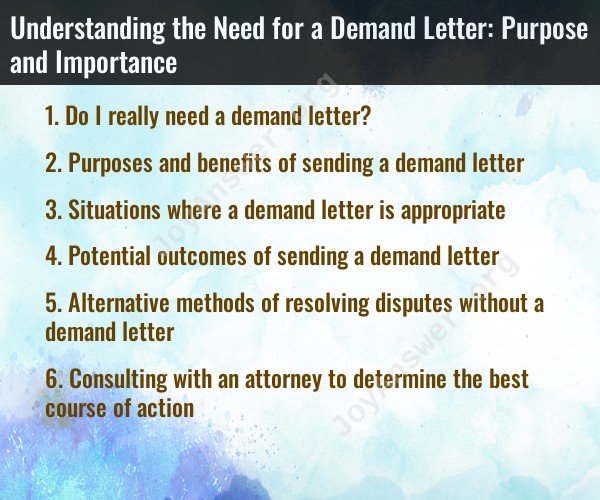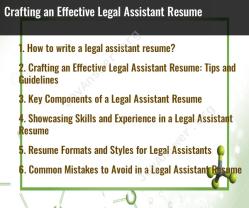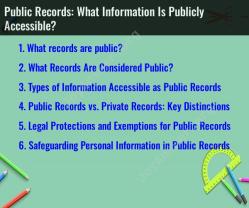Do I really need a demand letter?
The decision to send a demand letter depends on the circumstances of the situation you're facing. Here are some common scenarios where sending a demand letter may be appropriate:
Attempting Resolution Without Litigation:
- A demand letter is often the first step in attempting to resolve a dispute without going to court. It communicates your grievances and gives the other party an opportunity to address the issues before legal action is taken.
Requesting Payment for Damages:
- If you believe you are entitled to compensation for damages, a demand letter can formally request payment. This is common in situations such as personal injury claims, property damage, or contractual breaches.
Notifying of Breach of Contract:
- If someone has breached a contract, a demand letter can serve as a formal notice of the breach and request corrective action or compensation.
Addressing Non-Payment Issues:
- In business transactions, a demand letter can be used to request payment for goods or services that have been provided but not paid for.
Resolving Employment Disputes:
- In employment law, demand letters may be used to address issues such as wrongful termination, discrimination, or unpaid wages.
Seeking Compliance with Legal Requirements:
- In some cases, a demand letter may be necessary to request compliance with legal obligations, such as ceasing certain activities or correcting violations.
The demand letter serves several purposes:
Formal Communication:It provides a formal and written communication of your concerns, making it clear that you are serious about seeking resolution.
Documentation:It creates a written record of your position, which can be useful if the matter escalates to legal proceedings. This documentation can serve as evidence of your attempts to resolve the issue amicably.
Legal Requirement in Some Cases:In certain legal matters, sending a demand letter may be a prerequisite before initiating legal action. It can demonstrate to a court that you made a reasonable effort to resolve the dispute before pursuing litigation.
Preserving Relationships:In situations involving ongoing relationships, such as business partnerships or contracts, a demand letter can be a less adversarial way to communicate concerns and work towards resolution.
Before deciding to send a demand letter, it's important to carefully evaluate the specific circumstances, seek legal advice if necessary, and consider alternative dispute resolution methods. Keep in mind that the tone and content of the letter should be professional and clearly state your position and expectations for resolution.
Purposes and benefits of sending a demand letter
A demand letter is a formal written communication sent by one party to another demanding that the recipient take or refrain from taking a specific action. Demand letters are commonly used in legal matters to resolve disputes without resorting to litigation. They can serve several purposes and offer several benefits:
Formal Notification: A demand letter formally notifies the recipient of a dispute and outlines the sender's grievances. This can help prevent misunderstandings and open communication channels for resolving the issue.
Preserving Legal Rights: Sending a demand letter can help preserve the sender's legal rights. It establishes a record of the dispute and demonstrates the sender's intent to seek legal action if necessary.
Encouraging Resolution: Demand letters often act as a catalyst for resolving disputes without the need for litigation. The recipient may be more willing to negotiate or settle the matter once they receive a formal demand.
Cost-Effectiveness: Sending a demand letter is often less expensive than pursuing litigation. It allows parties to resolve their issues without incurring the costs of court fees and attorney representation.
Pre-Litigation Preparation: If a demand letter does not resolve the dispute, it can serve as valuable pre-litigation preparation. The sender can use the research and information gathered for the demand letter to strengthen their legal case.
Situations where a demand letter is appropriate
Demand letters are appropriate in a wide range of civil disputes, including:
Contract Disputes: When one party breaches a contract, the aggrieved party may send a demand letter requesting payment, performance, or other remedies.
Debts and Collections: Creditors may send demand letters to debtors requesting payment of outstanding debts.
Property Damage: Individuals or businesses may send demand letters to the responsible parties seeking compensation for property damage.
Personal Injury: Individuals who have suffered personal injury may send demand letters to the responsible parties seeking compensation for damages.
Insurance Claims: Policyholders may send demand letters to insurance companies disputing denied or inadequate claims.
Potential outcomes of sending a demand letter
Sending a demand letter can lead to several potential outcomes:
Negotiation and Settlement: The recipient of the demand letter may agree to negotiate a settlement, resolving the dispute without further legal action.
Voluntary Compliance: The recipient may comply with the demands of the letter, resolving the issue without the need for further negotiation.
Further Legal Action: If the recipient refuses to comply with the demands, the sender may pursue litigation.
No Resolution: The demand letter may not lead to a resolution, and further action may be necessary to resolve the dispute.
Alternative methods of resolving disputes without a demand letter
In some cases, alternative methods of dispute resolution may be more appropriate than sending a demand letter. These methods include:
Direct Negotiation: Parties may attempt to resolve their dispute directly through informal negotiation and communication.
Mediation: A neutral third-party mediator can assist parties in reaching a mutually agreeable settlement.
Arbitration: Parties may agree to submit their dispute to an arbitrator, who will make a binding decision.
Small Claims Court: For smaller disputes, small claims court may be a more informal and cost-effective option.
Consulting with an attorney to determine the best course of action
Before sending a demand letter or pursuing any other dispute resolution method, it is advisable to consult with an attorney. An attorney can assess the specific circumstances of your case, advise on the best course of action, and assist in drafting and sending a demand letter if appropriate. They can also provide guidance on alternative dispute resolution methods and represent you in court if necessary.













